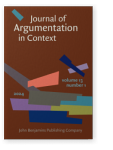Vol. 13:1 (2024) ► pp.49–73
The convergence of public sphere and state advocacy
A case study of the Qing Lang movement in China’s entertainment industry
In 2021, China’s entertainment industry experienced a series of unusual argumentative controversies followed by the creation of the Qing Lang movement initiated by the Chinese government that called for tackling irregularities in the industry. With strong support from the Chinese public, the Qing Lang movement presents an intriguing case to examine a new model of social argument representing both the public and state interest in resolving social problems in the Chinese version of the public sphere. The paper identifies key characteristics defining a reciprocal model of social activism in state-sponsored actions in China exemplified by the Qing Lang movement. The paper also argues for the value of a culture-specific approach to understanding public sphere and social activism and clarifies the function of argument in Chinese society.
Article outline
- 1.Introduction
- 2.Three connected factors of movement advocacy in a state-sponsored public sphere
- 2.1A perceived problem as a cause of public argument in the Chinese public sphere
- 2.2Dual actors of the state and the public in the Chinese sociocultural traditions
- 2.3Reciprocity between the dual actors in social advocacy
- 3.Irregularities in China’s entertainment industry
- 4.Public argument calling for rectification of entertainment irregularities
- 5.Governmental response to the public call for reform of the entertainment industry
- 6.Conclusion
- Notes
-
References
